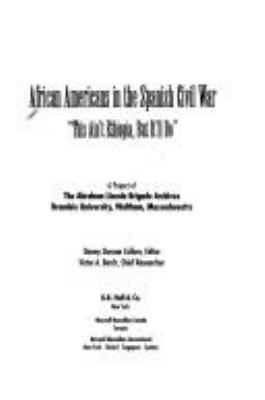
|
African Americans in the Spanish Civil War : "This ain't Ethiopia, but it'll do"
Copies
0 Total copies, 0 Copies are in,
0 Copies are out.
Title
African Americans in the Spanish Civil War : "This ain't Ethiopia, but it'll do"
Call No
DP269.47.A45
Subjects
Civil War (Spain : 1936-1939) fast (OCoLC)fst01352321
African Americans--Biography.
African Americans--Spain--Biography.
African Americans.
Military participation--African American.
Afro-Américain (peuple)--Américain à l'étranger (peuple, Etats-Unis)--brigade internationale--guerre d'Espagne.
Spain--History--Civil War, 1936-1939--Participation, African American.
Spain.
Biographies.
History.
Biography.
African Americans--Biography.
African Americans--Spain--Biography.
African Americans.
Military participation--African American.
Afro-Américain (peuple)--Américain à l'étranger (peuple, Etats-Unis)--brigade internationale--guerre d'Espagne.
Spain--History--Civil War, 1936-1939--Participation, African American.
Spain.
Biographies.
History.
Biography.
Language
English
Published
New York : G.K. Hall, ©1992.
Publication Desc
xiv, 234 pages : illustrations, map ;
ISBN
0816173788
LCCN
91031899
Dimensions
25 cm.









